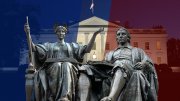The Trump administration this week opened another line of attack on Harvard—its ability to sponsor students, doctors, researchers, and professors for temporary immigration visas to the United States—while it announced a major settlement with Columbia University. The two actions underscore the current differences between Harvard and Columbia, both institutions that have been in Trump’s crosshairs, but may also suggest a path for an ultimate resolution outside of the courts.
In a news release on Wednesday, Secretary of State Marco Rubio wrote that his department is “opening an investigation into Harvard University’s continued eligibility as a sponsor for the Exchange Visitor Program.” Rubio continued, “All sponsors participating in this program are required to fully comply with exchange visitor regulations, transparency in reporting, and a demonstrated commitment to fostering the principles of cultural exchange and mutual understanding upon which the program was founded.”
The anodyne-sounding statement was anything but innocuous, viewed in the context of repeated investigations and accusations against the University—even as Harvard and the Trump administration are reportedly negotiating. The use of the plural—“sponsors must comply with all regulations, including conducting their programs in a manner…”—seemed to imply that this is just one such investigation among many. However, there is no evidence to suggest that any institution other than Harvard is being reviewed in this manner, and no process for pursuing this new investigation was mentioned. Earlier efforts to prevent Harvard from enrolling international students have so far been blocked in federal court.
Harvard responded with a statement of its own: “This investigation is yet another retaliatory step taken by the Administration in violation of Harvard’s First Amendment rights. Harvard continues to enroll and sponsor international scholars, researchers, and students, and will protect its international community and support them as they apply for U.S. visas and travel to campus this fall. The University is committed to continuing to comply with the applicable Exchange Visitor Program regulations.”
While Harvard pursues a legal battle to protect its rights, Columbia announced an agreement to pay a fine to restore its federally sponsored research. It also expelled some students, and suspended others, who occupied a university library in May. In a statement, U.S. Secretary of Education Linda McMahon said Columbia had agreed to “pay $200 million, discipline student offenders for severe disruptions of campus operations, make structural changes to their Faculty Senate, bring viewpoint diversity to their Middle Eastern studies programs, eliminate race preferences from their hiring and admissions practices, and end DEI programs that distribute benefits and advantages based on race.” McMahon praised the reforms as “a roadmap for elite universities that wish to regain the confidence of the American public by renewing their commitment to truth-seeking, merit, and civil debate. I believe they will ripple across the higher education sector and change the course of campus culture for years to come.”
As Harvard’s standoff with the federal government continued, Harvard College Dean David Deming announced that offices dedicated to the support of women, minorities, and LGBTQ+ students would be consolidated into the new Office of Culture and Community, an action that echoes some of the concessions Columbia made in its negotiation with the government.
Some Harvard faculty members seem poised to push back on any negotiation with the Trump administration. In an opinion piece published in The Harvard Crimson June 26, professor of government Ryan Enos and Rockefeller professor of Latin American studies Steven Levitsky noted that the government’s actions have “crippled critical research, derailed careers, forced layoffs, and cruelly disrupted the lives of thousands of international students”—and characterized any compromise as “authoritarian extortion.”
The “current leverage over Harvard was attained through a series of illegal acts,” they wrote. “As the University’s lawsuits clearly show, the government violated the law and the Constitution when it arbitrarily withheld billions of dollars in congressionally approved research funds. Using the power of the federal government to punish a university because you don’t like its politics is a blatant violation of the First Amendment.” The Trump administration, they continued, “is now offering relief from some of that illegally imposed hardship in exchange for Harvard’s adoption of policies that are aligned with the government’s ideology. This is not a ‘negotiation.’ It is extortion.”









